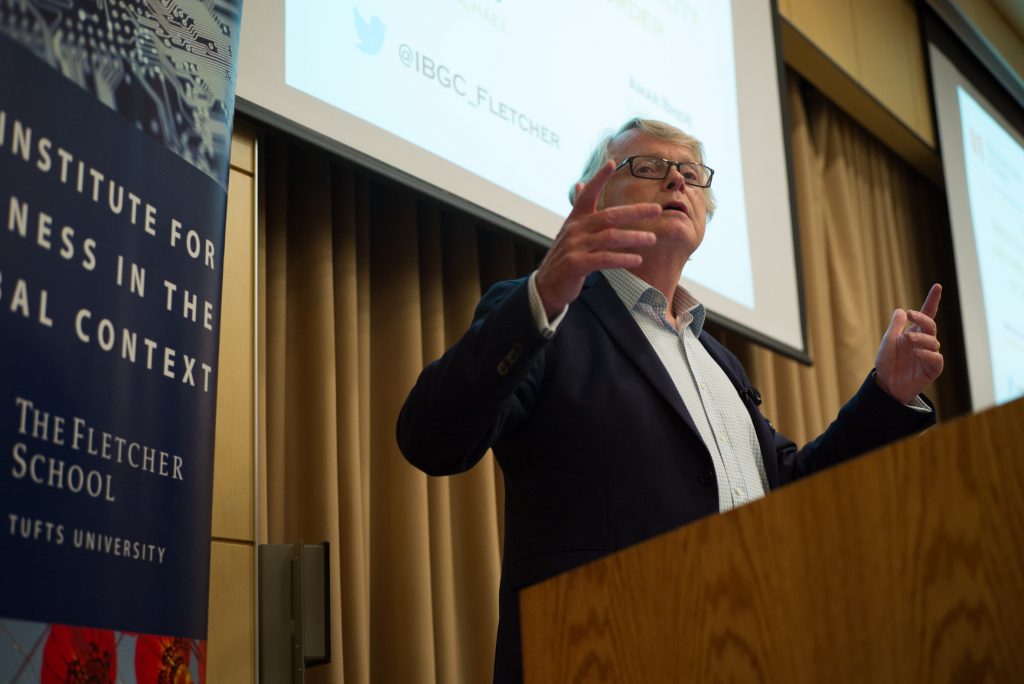Fletcher Reads the Newspaper: Is Brexit a “house of cards” that threatens the stability of the world order?
The latest edition of “Fletcher Reads the Newspaper” tackled the thorny question: Is Brexit a “house of cards” that threatens the stability of the world order? After introductions by Bhaskar Chakravorti, Senior Associate Dean of International Business and Finance at The Fletcher School, and Lisbeth L. Tarlow, Chair of The Fletcher School Board of Overseers, the two debaters kicked off.

Lord Michael Dobbs, introduced as “Westminster’s baby-faced hitman,” wasted no time attacking the premise of stability to begin with. He claimed global stability disappeared at least twenty years ago. The seasoned debater laid out the three-part argument that a) there is no stable world order b) the EU is the cause of instability and c) the EU failed the challenge of changing internally due to its undemocratic nature. Countering the common narrative that the UK left the EU for economic reasons, Dobbs insisted that the UK left to reclaim its sovereignty, which has been compromised by an “arrogant, authoritarian, inefficient, ineffective, and elitist” EU that refused to reform itself. According to Dobbs, the democratic deficit generated by decision-making in Brussels by unelected representatives is irreconcilable, and the EU itself is in danger of becoming a “house of cards.”
Dr. Amar Bhidé, after excusing himself for this “hopelessly mismatched debate” took a different approach, borrowing a page from British economist John Kay to illustrate the perils of Brexit using the example of regulation on jam. Bhidé demonstrated how the trade and safety regulations so lamented by the pro-Brexit camp in fact will not be eliminated by leaving the EU, and are actually made less burdensome by unifying standards across the region. He went on to extend the jam example to immigration, claiming that Brexit is really about the flow of people, which also will not end with Brexit and is arguably much more important to the economy than the flow of jam.
Watch the full debate between Lord Dobbs and Prof. Bhidé on the Fletcher School Facebook page
Dobbs countered Bhidé’s jam example by asking why the EU has categorized tomatoes as a fruit rather than a vegetable. He also took issue with the immigration argument, saying Brexit is not anti-immigrant but about flexibility. He returned to the importance of sovereignty and self-determination, going so far as to paint a parallel trans-American governing body, which he supposed U.S. residents would not be fond of.
The conversation then turned to economics, and how the fate of Greece’s economy has been shaped by EU membership. Dobbs asked why has Greece been “reduced to servitude” in its inability to repay debts, while Bhidé countered that this is the fourth or fifth time Greece has gone bankrupt, and in fact the UK still has monetary sovereignty via the Bank of England as an EU member. Bhidé went on to claim that Greeks want the Euro because their government is corrupt and irresponsible and therefore it is not the Euro that is bringing down Greece.

After banter between the two debaters, moderated by Dean Chakravorti, the audience was invited to ask questions of the two. Is the world safer or less safe with the UK out? Less safe, said Bhidé. Brexit weakens Europe to deal with regional and global crises. Dobbs countered that while there may be a few years of instability to come, Brexit will make the UK a better friend to Europe when all is said and done. What about the referendum? Does this not legitimize the use of illogical arguments in campaigning? Dobbs claimed “people knew the reality” and bigotry has been overplayed by elites. Bhidé sees the results as evidence that, “people don’t trust posh people” and the social compact has broken down.
As Fletcher students, global elites ourselves, what are we to make of this? In the final vote of the evening, a majority agreed with the statement that Brexit is not a “house of cards.” But perhaps more important here is Dobb’s point—that the EU itself in danger of being one. Whether we agree that Brexit was good or bad for Britain, for Europe, and for global institutions, the debate is symptomatic of a larger issue we must address. That is, how do we ensure our political and social institutions are not built on shaky foundations, and reach the population they’ve been built to serve.
